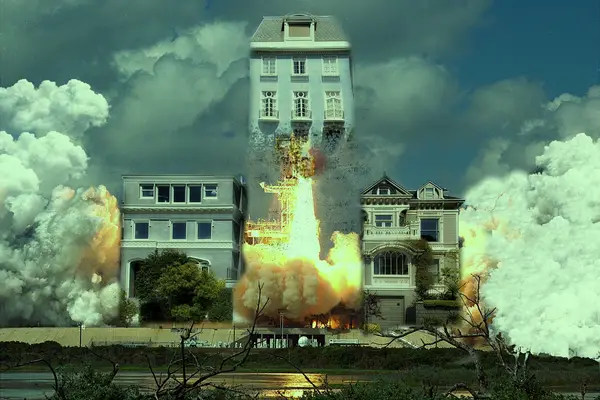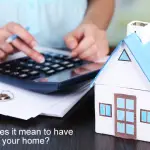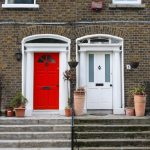
For most people in the UK, their home is the biggest asset they will ever own. If this is you and you’re worried about house prices after Coronavirus and whether they are going up or down, this article takes a look at the problem.
Early predictions of house prices after Coronavirus were a fall of between 5% to 16%. But nobody really knows whether UK house prices will go up or go down after Coronavirus. Early signs show a small price increase as the market shows resilience. But the true test comes after the furlough scheme comes in an end.
House price prediction after Covid-19 in the UK
The level of fall (or not) will depend on how quickly the economy recovers from the Coronavirus lockdown. But also, the housing market will continue to be affected where the banks restrict lending by offering lower loan to value (LTV) percentages.
In many cases the LTV has dropped from 90% to 75%, which would require an additional deposit of nearly £35,000!
Plus if surveyors and valuers are minded to down-value houses for mortgage lenders, this will have a knock-on effect on house prices across the UK.
House price predictions after Coronavirus in the UK range from a drop of between 5% to 16%.
Based on the average house price in the UK of £231,855, this represents an average fall in house prices of anywhere between £11,593 to £37,097. The level of fall will depend on how quickly the economy recovers from the Coronavirus lockdown.
But also, the housing market will continue to be affected where the banks restrict lending by offering lower loan to value (LTV) percentages. In many cases the LTV has dropped from 90% to 75%, which would require an additional deposit of nearly £35,000!
Plus if surveyors and valuers are minded to down-value houses for mortgage lenders, this will have a knock-on effect on house prices across the UK.
I’m going to begin with a sample of predictions where the ‘property experts‘ are predicting house prices after Coronavirus (Covid-19). Bear in mid these are predictions and not set in stone.
But also please bear in mind the fact that the press are good at publishing the doom and gloom. Where this is doom and gloom over house prices after Coronavirus or otherwise, please be mindful of the fact this may end up being a self fulfilling prophesy in any event. But more of this further into the article, because even though this might be the case, there’s no doubt many will be right as there are so many job losses across the country that’s bound to have an effect. It’s the quantum or percentage fall that’s the bigger question.
But let’s take a look at house prices Coronavirus predictions I’ve read so far:
The Bank of England have predicted a fall in residential property prices of 16%.
“Bank staff have modelled residential property prices to be driven by unemployment and long-term interest rates. In this framework, the downward pressure on residential property prices from the increase in unemployment in the MPR* scenario is judged to be offset, to some extent, by the impact of persistently low long-term interest rates embodied in current market prices. Taking these two effects together, the FPC** judges that a fall of 16% in UK residential property prices could be consistent with the MPR scenario.”
Bank of England – Interim Financial Stability Report (*MPR = Monetary Policy Report; **FPC = Financial Policy Committee)
The Bank of England go on to predict that after house prices fall, prices are then assumed to rise gradually as economic activity in the UK recovers. As they forecast that unemployment should begin to fall once more as economic activity returns.
House price prediction after Covid-19 according to This is Money article
Reported by This is Money, as the property market is given the green light, leading estate agent Knight Frank forecast in May 2020 that house prices will fall 7% over the coming 12 months.
However, the Coronavirus affect on house prices in the UK according to Which discuss how Knight Frank forecast that UK prices will fall by 3% this year (i.e. 2020), but then will bounce back by 5% in 2021. Whereas with Savills they have put forward two alternative predictions. One being that house prices will fall by 5% in 2020, followed by a rise in 2021 by 5%. And the other where prices will fall by 10% in 2020, followed by an increase in 2021 of 4%. But finally, Which also report on what Lloyds Banking Group forecast, which is that prices will fall by 5% in 2020, followed by a small increase of 2% in 2021.
So with this plethora of house price predictions, where’d does that leave you? I guess if you have to sell your house, then you will have to go with the market. But see below how this could be advantageous for you if you’re going up the property ladder. But possibly if you don’t have to sell your house, I’d suggest you sit tight and wait to see what happens with the property market and values.
The current average house price in the UK stands at £231,855. If house prices were to fall as predicted by the Bank of England by 16%, this would result in an average fall of £37,097. Whereas if house prices fall by the lower levels predicted of around 5%, this would reduce the average UK house price by £11,593 instead.
Valuations and mortgage options will slow the market down
One of the driving forces behind property prices, in addition to supply and demand, is surveyor valuations and how much the lenders will lend in terms of loan to value (LTV) on properties. We’ve already seen that mortgage lenders are reducing their LTV to home buyers. We’ve seen these drop from borrowers being able to tap into 90% mortgages to a reduced 75% LTV rate post-Covid-19.
If buyers don’t have the higher deposit to be able to make up this gap of a higher deposit requirement, this will stop them in their tracks. This will impact first time buyers in particular, as they won’t have equity in an existing home to use for a deposit.
For example:
- If we use the average price of a UK home noted above of £231,855.
- A change from the requirement of a 10% deposit to a 25% deposit means you’ll need £34,778 (i.e. £57,964 – £23,186)
Advantages of a house price fall – the winners!
As with most things in life, there will always be winners and losers in any situation. Th winners when house prices are falling are those who are moving up the property ladder. The reason why this is the case is that the higher value house will lose more off its value than the lower price house.
For example:
- If you currently live in a house worth say £200,000.
- Then let’s say due to Coronavirus the price fell by 10%.
- This represents a fall of £20,000.
- If your aim is to buy a house that was worth say £300,000 prior to Covid-19.
- This could now be worth £270,000 instead with a similar fall of 10% or £30,000.
But not all house prices are equal
The above concept assumes that all house prices are equal. They are not! The prices of house or property across the whole board for that matter depends on a few factors. This includes the property’s location (i.e. location, location, location), for example, whether the property is on a main road or not etc.! It also depends on the area (i.e. regionally) within the country where the property is located. For example, there’s a huge value divide between the north of the country vs the south. The conditoion of the property and how well maintained it is.
But what we’ve also seen is a difference in the type of property too. For example, flats with roof terraces or gardens are likely to increase in value more than flats without these facilities. During lockdown, people who were living in flats had nowhere to go other than within their four walls. But those with gardens at least had this outlet to relax and enjoy.
Disadvantages of a house price fall – the losers!
The time when house price falls are a disadvantage is firstly if you have a high loan to value mortgage on your property. If the value of your house falls to below what you owe on the mortgage, this will put you into negative equity.
This would then put you in the negative equity trap. This means the proceeds from selling your house won’t be enough to cover your mortgage. You may find you can’t sell your house. But if you end up being caught in this situation, please contact us to see if we are able to help you with one of our creative solutions.
The second disadvantage of a house price fall is if you are downsizing. With a downsize, the house you are selling will likely be worth more than the house you are buying. The result would be a loss of more ‘house-value’ on the more valuable house you’re selling vs the less valuable house you’re buying.
What may hold you back if you must sell
More about what might hold you back if you have to sell during the Coronavirus outbreak. The following are what might hold you back:
- Government help to buy scheme: If you purchased your house using the Help to Guy Scheme you may well end up owing more on your home than it’s worth. This is effectively negative equity (see below). When you sell your house you have to repay all loans secured on it. Which includes the mortgage and the Help To Buy loan too. If as a result of the Covid-19 lockdown your house value has fallen below the total of your mortgage and the Help to Buy loan, this may prevent you from selling your house. Unless you have enough spare savings to repay any excess.
- Negative equity: The above example is similar to negative equity when you can’t sell your house for what you owe. But when I talk about negative equity in isolation I’m referring to when your house is worth less than the mortgage secured on it. Unless you have the savings available to be able to repay the excess to the bank when you sell you house, this could trap you and prevent you from selling your house.
If you find yourself in the situation where you can’t sell your house as a result of negative equity, what are you options? You may wish to read this article: I Can’t sell my house but want to buy another (What are your options?); Or What happens if you can’t sell your house? (11 real solutions that work!).
The self-fulfilling prophesy of house price doom prediction
Whether the so called experts are predicting a recession, a stock market crash or in this case a housing market crash, their predictions and news reports about it could be the cause of the crash in the first place.
If enough of the so called experts are saying enough about doom and gloom, then it doesn’t take too much to work out that people will begin to behave differently. It may be that a housing market fall might have happened in any event, but the news reports won’t help.
Having said that I do believe that house prices will indeed fall. This is simply down to economics. Many people have unfortunately lost their jobs during the Covid outbreak. But the job-losses figure is being masked by the furlough situation.
It will be only after the furlough payments are withdrawn by the government that the true unemployment figures will show through. This will lead to a recession in the UK, which will impact on house prices. Plus that’s not to mention this is a global pandemic. The world will go into a big recession and this will impact in a bigger way on the UK economy.
If this article has helped about “House prices after Coronavirus going up or down in the UK” please share it on your favourite social media site.
Also, if you have any questions, please feel free to comment below too. Alternatively, if you need more help, please feel free to contact us on our contact us page here. Or join the discussion and ask your question in the property forum.




